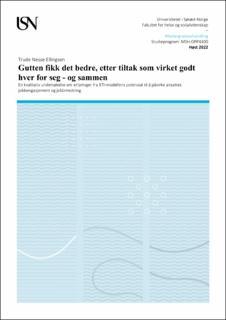| dc.contributor.advisor | Øvergård, Kjell Ivar | |
| dc.contributor.author | Ellingsen, Trude Nesse | |
| dc.date.accessioned | 2023-01-31T17:41:15Z | |
| dc.date.available | 2023-01-31T17:41:15Z | |
| dc.date.issued | 2022 | |
| dc.identifier | no.usn:wiseflow:6699521:51987703 | |
| dc.identifier.uri | https://hdl.handle.net/11250/3047537 | |
| dc.description.abstract | I 2012 startet Helsedirektoratet, Kompetansesenteret på rusfeltet (KoRus) og åtte norske samarbeidskommuner et samarbeid med å videreutvikle en dansk modell for tverrfaglig samarbeid. Denne videreutviklingen ble tilpasset norske forhold. Modellen ble kalt BTI-modellen (Bedre Tverrfaglig Innsats) og er en modell for samhandling som skal sikre at profesjonelle yrkesutøvere tidlig skal oppdage sårbare og utsatte barn og familier, og forbedre tverrfaglig samarbeide.
Mange forskningsstudier undersøker demografisk, faglig og økonomisk gevinst ved tverrfaglig samarbeid. Denne studien ønsker å belyse hvorvidt et godt tverrfaglig samarbeid kan medføre individuelle gevinster hos de ansatte. Det var formålstjenlig å undersøke dette i en kommune som har tverrfaglig samarbeid som en etablert, systematisk arbeidsmetodikk. Mange kommuner benytter seg av BTI-modellen som en slik plattform. I lys av BTI-modellen er det derfor ønskelig å undersøke hvorvidt det finnes en egenverdi ved et godt tverrfaglig samarbeid som i seg selv kan utløse jobbengasjement og jobbmestring hos ansatte.
Forskningsoppgaven tar utgangspunkt i en forhåndsbestemt teoretisk referanseramme for å kunne belyse problemstillingene. Innsamling av kvalitative data er gjort gjennom semistrukturerte intervjuer av syv respondenter. Resultatene fra forskningen omfattet altså deduktive aspekter, men ble underveis i prosessen utvidet med induktive aspekter. Den abduktive analysen av oppgavens datamateriale førte frem til en ny utfallsvariabel, den konseptuelle motivasjonsfaktoren «mening». Følgelig ble det da nødvendig å diskutere hvordan man kunne forstå dette resultatet innenfor det teoretiske rammeverket.
Resultatene fra undersøkelsen viser at BTI-modellen kan, dersom den oppleves som en godt implementert modell hos alle samarbeidende enheter, føre til økt jobbengasjement. Økt jobbengasjement kan medieres gjennom de underliggende psykologiske motivasjonsprosessene autonomi, kompetanse og tilhørighet, der autonomi var den motivasjonsfaktoren som økte mest. Mening er en motivasjonsfaktor og et tilleggsfunn som potensielt kan gi nye perspektiver innenfor det eksisterende teorigrunnlaget som forskningsoppgaven bygger på. | |
| dc.description.abstract | In 2012, the Directorate of Health, the Competence Center in the Drug Field (KoRus) and eight Norwegian partner municipalities started a collaboration to further develop a Danish model for interdisciplinary collaboration. This further development was adapted to Norwegian conditions. The model was called the BTI model (Bedre Tverrfaglig Innsats) and is a model for interaction that will ensure that professionals will recognise vulnerable and exposed children and families at an early stage, and improve interdisciplinary cooperation.
Many research studies examine the demographic, professional and financial benefits of interdisciplinary collaboration. This study wants to shed light on whether a good interdisciplinary collaboration can lead to individual gains for the employees. It was expedient to investigate this in a municipality that has interdisciplinary collaboration as an established, systematic working methodology. Many municipalities use the BTI model as such a platform. In the light of the BTI model, it is therefore desirable to investigate whether there is intrinsic value in good interdisciplinary collaboration which in itself can trigger job commitment and job mastery in employees.
This research paper is based on a predetermined theoretical frame of reference in order to illuminate the issues. The collection of qualitative data has been performed through semi-structured interviews with seven respondents. The results from the research therefore included deductive aspects, but were expanded with inductive aspects during the process. The abductive analysis of the research data yielded a new outcome variable: the conceptual the motivational factor of “meaning”. Consequently, it became necessary to discuss how this result could be understood within the theoretical framework.
The results of the survey show that the BTI model can, if it is perceived as a well-implemented model by all cooperating units, lead to increased job commitment. Increased job commitment can be mediated through the underlying psychological motivational processes of autonomy, competence and belonging, where autonomy was the motivational factor that increased the most. “Meaning” is a conceptual motivational factor and an additional finding that can potentially add new perspectives within the existing theoretical basis on which the research paper is based. | |
| dc.language | nob | |
| dc.publisher | University of South-Eastern Norway | |
| dc.title | "Gutten fikk det bedre, etter tiltak som virket godt hver for seg- og sammen". En kvalitativ undersøkelse om ansattes erfaringer fra BTI- modellens potensial til å påvirke ansattes jobbengasjement og jobbmestring | |
| dc.type | Master thesis | |
